"All My Trials" is a folk song which became popular during the social protest movements of the late 1950s and 1960s. Alternative titles it has been recorded under include "Bahamian Lullaby" and "All My Sorrows." The origins of the song are unclear, as it appears to not have been documented in any musicological or historical records until after the first commercial recording was released on Bob Gibson's 1956 debut album Offbeat Folksongs.

Colin James Hay is a Scottish-Australian musician, singer, songwriter, and actor. He came to prominence as the lead vocalist and the sole continuous member of the band Men at Work, and later as a solo artist. Hay's music has been used frequently by actor and director Zach Braff in his work, which helped a career rebirth in the mid-2000s. Hay is a member of the band Ringo Starr & His All-Starr Band.

James Taylor is the debut studio album by American singer-songwriter James Taylor. Released on December 6, 1968, it was the first recording by a non-British artist released by Apple Records, and would also be Taylor's only release on that label. The album was released under the title First Album on the South African market.

Switch is the tenth album by Dutch rock band Golden Earring, released in 1975.
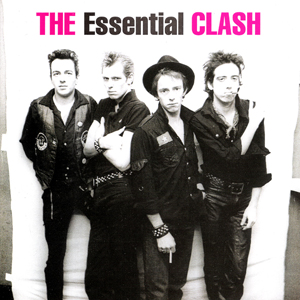
The Essential Clash is a career-spanning greatest hits album by The Clash first released in 2003. It is part of the ongoing 'The Essential' Sony BMG compilation series. The album is dedicated to Joe Strummer, who died during its compilation.
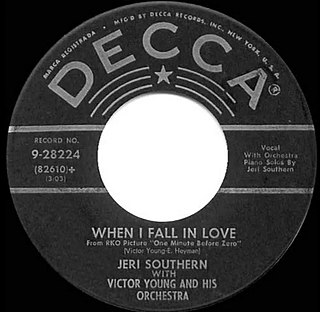
"When I Fall in Love" is a popular song, written by Victor Young (music) and Edward Heyman (lyrics). It was introduced in Howard Hughes' last film One Minute to Zero as the instrumental titled "Theme from One Minute to Zero". Jeri Southern sang on the first vocal recording released in April 1952 with the song's composer, Victor Young, handling the arranging and conducting duties. The song has become a standard, with many artists recording it; the first hit version was sung by Doris Day released in July 1952.
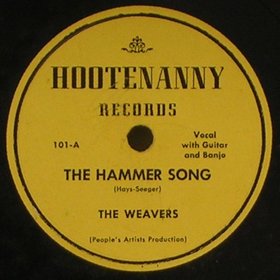
"If I Had a Hammer " is a protest song written by Pete Seeger and Lee Hays. It was written in 1949 in support of the Progressive movement, and was first recorded by the Weavers, a folk music quartet composed of Seeger, Hays, Ronnie Gilbert, and Fred Hellerman. It was a #10 hit for Peter, Paul and Mary in 1962 and then went to #3 a year later when recorded by Trini Lopez in 1963.

"Fever" is a song written by Eddie Cooley and Otis Blackwell, who used the pseudonym "John Davenport". It was originally recorded by American R&B singer Little Willie John for his debut album, Fever (1956), and released as a single in April of the same year. The song topped the Billboard R&B Best Sellers in the US and peaked at number 24 on the Billboard pop chart. It was received positively by music critics and included on several lists of the best songs when it was released.

"He Ain't Heavy, He's My Brother" is a ballad written by Bobby Scott and Bob Russell. Originally recorded by Kelly Gordon in 1969, the song became a worldwide hit for the Hollies later that year and also a hit for Neil Diamond in 1970. It has been recorded by many artists in subsequent years. The Hollies' version was re-released in 1988 and again was a major hit in the UK.
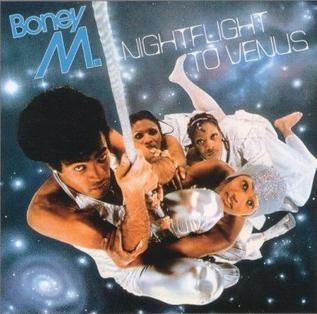
Nightflight to Venus is the third studio album by Euro-Caribbean group Boney M., and was released in June 1978. The album became a major success in continental Europe, Scandinavia, and Canada, topping most of the album charts during the second half of 1978 and also became their first UK number one album. In Canada, it received a nomination for a 1980 Juno Award in a category 'International Album of the Year'.

"Bang Bang (My Baby Shot Me Down)" is the second single by American singer-actress Cher from her second album, The Sonny Side of Chér (1966). It was written by her husband Sonny Bono and released in 1966. The song reached No. 3 in the UK Singles Chart and No. 2 on the Billboard Hot 100 for a week (behind "(You're My) Soul and Inspiration" by The Righteous Brothers), eventually becoming one of Cher's biggest-selling singles of the 1960s.

Peter, Paul and Mary is the debut studio album by American folk trio Peter, Paul and Mary, released in May 1962 on Warner Bros. Records. Released in both mono and stereo on catalog no. 1449, it is one of the rare folk albums to reach No. 1 on the Billboard chart in the US, where it remained for over a month. The lead-off singles "If I Had a Hammer" and "Lemon Tree" reached numbers 10 and 35 respectively on the Billboard Pop Singles chart. It was the group's biggest selling studio album, eventually certified Double Platinum by the Recording Industry Association of America for U.S. sales of more than two million copies.

"Babbacombe" Lee is a 1971 album by British folk rock group Fairport Convention, which tells the life story of John Babbacombe Lee, a Victorian-era alleged murderer who was condemned to death but was reprieved after the gallows failed on three occasions to work properly. After the commercial and chart success of its predecessor, Angel Delight, the album sold disappointingly, though it was critically acclaimed, and is regarded by the authors of The Electric Muse (1975) as the first "folk rock opera". It was the band's seventh album since their debut in 1968.

"Overkill" is a song by Australian pop rock band Men at Work. It was released in March 1983 as the second single from their second studio album Cargo. Written by lead singer Colin Hay, it peaked at No. 3 on the Billboard Hot 100; No. 5 on the Australian Kent Music Report Singles Chart; and top 10 in Canada, Ireland, and Norway. The song was a departure from the group's style of reggae-influenced pop rock, featuring a melancholic feel musically and lyrically.

"Mike Oldfield's Single " is the debut single by the English musician Mike Oldfield, released in 1974.

Now You See Me, Now You Don't is the 25th studio album by Cliff Richard, released in August 1982. The album is largely a mix of lightly veiled and more overtly gospel-message tracks, together with a few non-gospel tracks. It reached No. 4 in the UK Albums Chart, No. 1 in Denmark, No. 21 in Australia and No. 19 in New Zealand. It was certified Gold in the UK.

A World of Our Own is the fourth studio album by the Australian group The Seekers. The album was released in 1965. In some countries, the album was titled The Seekers. The album peaked at number 123 in the Billboard 200 and number 5 in the United Kingdom.
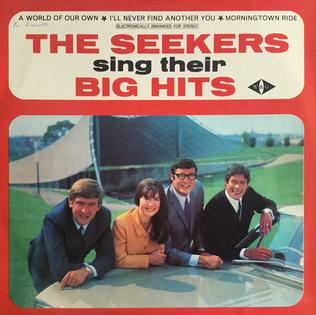
'The Seekers Sing Their Big Hits is the first compilation album by the Australian group The Seekers. The album was released in 1965 and includes tracks from their four studio albums to-date. The album peaked at number 3 and was the 16th biggest selling album in Australia in 1967.

Introducing the Seekers Big Hits is the second compilation album by the Australian group The Seekers. The album was released in 1967 as a double LP. The album peaked at number 5 in Australia in 1967.
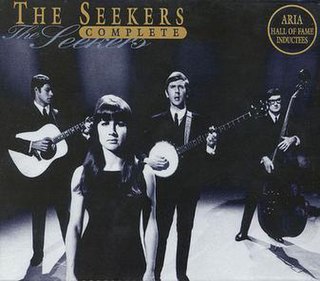
The Seekers Complete is a 5-disc box set by Australian band The Seekers. It was released in December 1995 following the group's induction into the ARIA Hall of Fame at the ARIA Music Awards of 1995.



















